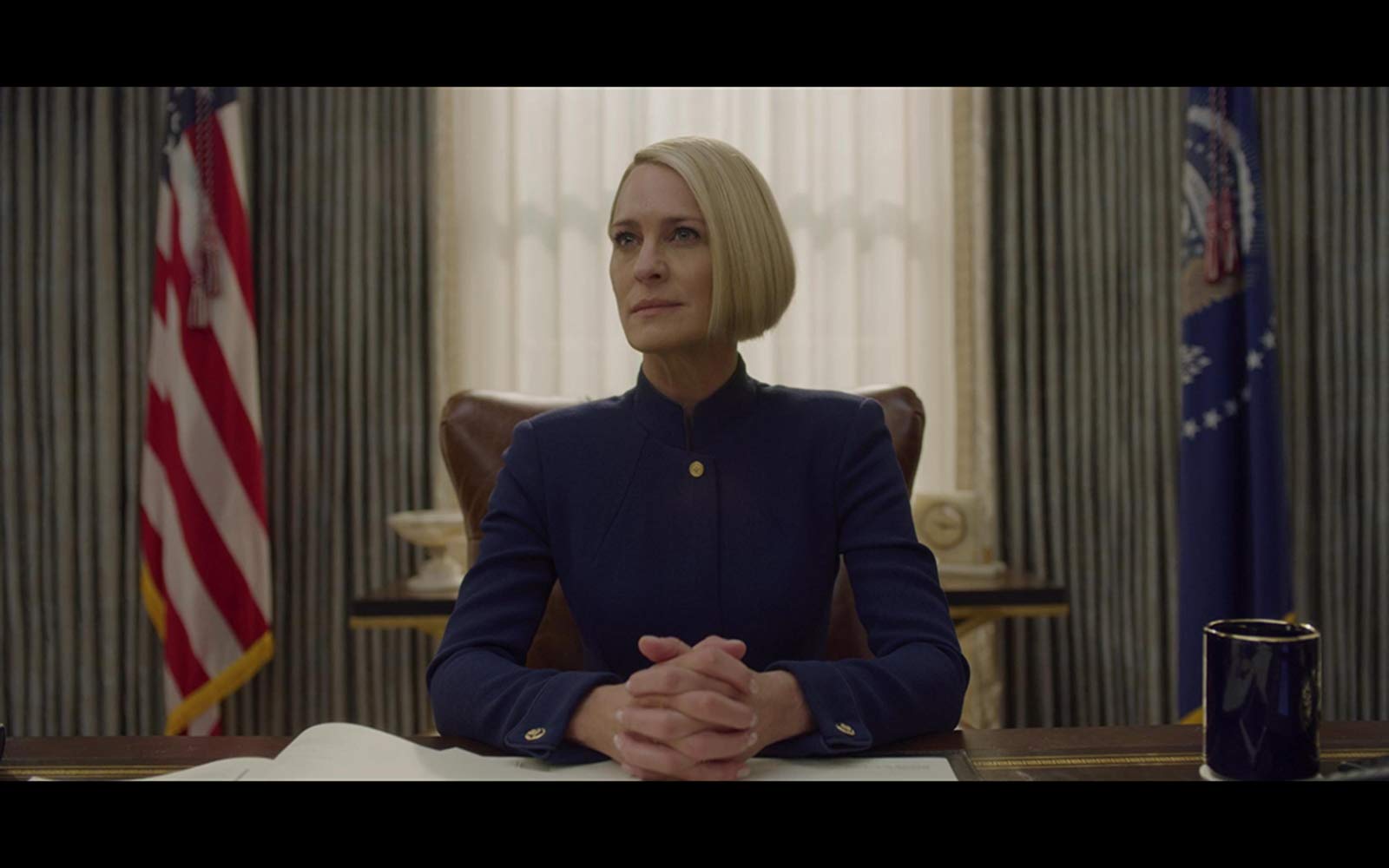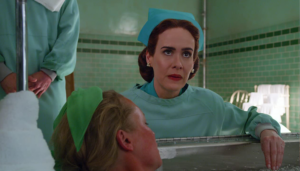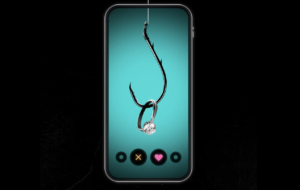House of Cards has had a lot thrown its way. When it was picked up by Netflix to become the streaming service’s first original series in 2013, no one knew if this new form of web television would work. It was a gamble.
But then the first three seasons were critically praised. The program became the first online-only series to be taken seriously and earn numerous Emmy nominations. They had successfully navigated this uncharted web territory, proving that the platform can have success. Then came Curveball #1: the 2016 presidential election.
The first season premiered soon after Obama’s reelection (feels like a lifetime ago, I know). Relative to the real world at that time, House of Cards felt like a delicious backstage peek into this fictional American political arena. The high stakes drama, the cutthroat, indulgently evil characters of Frank (Kevin Spacey) and Claire Underwood (Robin Wright), and the fresh format that didn’t have viewers waiting week to week for new episodes all worked to create an excellent model for the bingeable shows that saturate today’s television market. When House of Cards worked, it really worked.
However, its quality began going downhill around its fourth and fifth seasons. Though creator Beau Willimon did step down as showrunner after Season 4 came out in 2016, it’s tempting to wonder if the change in the American political landscape had an effect on the show’s decline. The program lost its ability to truly entertain when the events of the show were no longer crazier than those of the real world. They learned the hard way about the difficulties of telling a political satire in the age of Trump.
I struggled with getting invested in the show post-Willimon. Frank had schemed, lied, and killed his way up to the presidency. His rise was enticing at first, but it quickly got old. I kept waiting and waiting for his bad deeds to catch up with him, but he continued his unpopular rule without ever facing consequences.
That is, until Curveball #2: the Kevin Spacey controversy.
The writers had nearly finished writing all of Season 6 when news of the sexual misconduct allegations against Spacey broke. Soon after, Netflix cut all ties with Spacey and the writers went back to work trying to ensure that the show would somehow go on without their lead actor.
All eyes were on this sixth and final season to see how they would deal with Spacey’s removal. The writers chose to kill off Frank and continue with Claire as president. This left the storyline wide open, with Robin Wright finally taking center stage—a narrative change viewers had been wanting long before the scandal, as Claire was always the more nuanced, intriguing character.
This blank slate meant the show could go in so many different directions. With Frank gone, will Claire step out of her husband’s shadow? What will her legacy be as the first female president? Will journalists Tom Hammerschmidt (Boris McGiver) and Janine Skorsky (Constance Zimmer) dig up all the skeletons in the Underwoods’ expanding closet? Will Claire be able to both rock a pantsuit and somehow work her magic to outmaneuver all her opponents?
Sure, the past few seasons were rocky. But when I thought of all the ways this season could deliver a satisfying payoff before the story’s conclusion, I got excited about House of Cards for the first time in a while.
But alas, my excitement quickly turned to disappointment. For reasons I’m still trying to figure out, the writers decided to make this season all about Frank, despite having finally gotten rid of him. Season 6 essentially turns into a murder mystery that no one asked for. When Claire isn’t busy trying to figure out how Frank died, she is off becoming Frank herself. She fits right into her late husband’s unethical shoes. She even commandeers Frank’s signature fourth-wall breaking, but turns what used to be a chilling move into an overdone gag. The asides are far too frequent and the writing not nearly as effective, no matter how fiercely Wright delivers those lines into the camera.
There are no stakes to Claire’s presidency, just as with Frank’s. She can get away with the same lies, fear mongering, and mistreatment of cabinet members that he could. This unfortunately keeps the drama pretty low, and the story does very little to keep the viewer interested in Claire’s future.
This season does have a few shining moments, though. In Episode 5, the cabinet, fed up with Claire’s refusal to operate on anyone’s terms but her own, tries to invoke the 25th amendment and replace her with the vice president, Mark Usher (Campbell Scott). Claire enters the meeting, coolly fires each member, and then replaces them with an all-female cabinet. The sight of Claire entering the next meeting with a room full of women is truly a great emotional moment.
Regrettably, that powerful sense of wonder and pride comes and goes all too quickly. The concept was promising, but Claire ends up pulling a classic Frank move, treating the women just as poorly until they too end up wishing someone else were their president. The Claire I loved from the first three seasons was far too smart to so carelessly turn allies against her. She was always as power-hungry as Frank, but she was usually much better at playing the long game.
The fear men have of women in power is an endlessly rich theme to draw upon. Unfortunately, any time there is a hint of some actual conflict arising, Claire quells it by pulling the woman card in the worst way. Essentially, her response to any piece of criticism is, “Would you criticize me if I were a man?” Those moments are probably the most disappointing because the show had an opportunity to really say something about a woman’s ability in the Oval Office, especially after a female candidate in the real world had recently fallen short of that chance.
Another rare highlight of this final season is the increased screen time given to Frank’s former right-hand-man Doug Stamper—but only because it let Michael Kelly show off his acting skills one last time. Doug’s loyalty to the despicable politician was one of the series’ most fascinating features. However, Doug’s devotion is reduced to a vehicle for the show’s unavoidable meta-narrative that clouds too much of its already convoluted plot.
After Frank’s sudden, strange death, Doug becomes absolutely obsessed with protecting Frank’s legacy and getting public figures to stop tarnishing his name. Frank was insufferably evil towards the end of last season, but Doug wants to make sure that the wrongdoings Frank committed in his final days do not discredit the rest of his political career that came before.
Separating the man from the legacy—that is the crux of Doug’s (unsatisfying) arc this season. It’s also Netflix’s not-so-subtle way of saying that House of Cards is not Kevin Spacey. They clearly want the reputation of their show as far away from Spacey’s downfall as possible. (idigtexas.com)
Season 6 is a giant let down, and a bit of a mess. House of Cards was given a gift. They had the perfect chance to let Robin Wright shine and have the audience really get to know Claire Underwood, rather than watch her exist simply to solve Frank’s murder. The show, like Doug, is too concerned with leaving an unproblematic legacy. No matter how brilliantly Wright works with the material she was given, she cannot possibly save this series that fizzles out into an anticlimactic, unfulfilling end.




